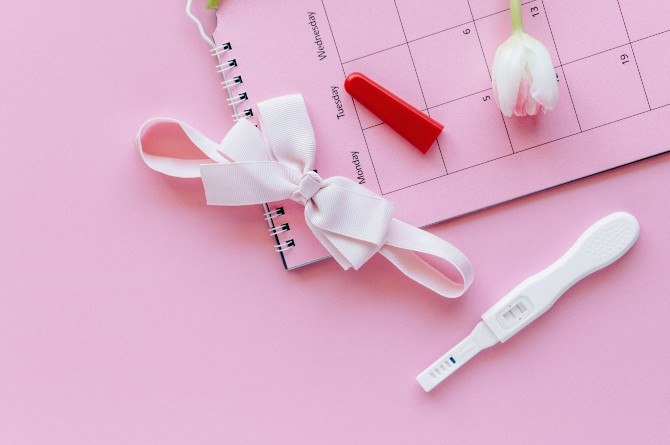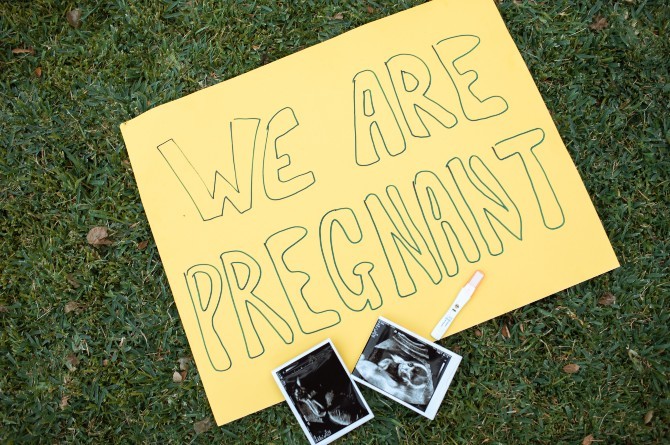Ovulation is a key part of the menstrual cycle. And many women often have a love-hate relationship with their period. Trying to find out when it will, how long it will last, and if you can get pregnant, are all tricky questions.
Only if your actual period was as precise as the period tracker app on your phone!
For those looking to get pregnant (or trying to actively avoid it), your monthly “fertile window” is usually mid-cycle. This would translate to around the 14th day if you have a 28-day cycle. Of course, not every woman has a perfect menstrual cycle, so the fertile window can vary for every individual and also month-to-month.
But can ovulation take place after the period ends? While that may not always be the case, there are odds where it is possible.
If you sporadically ovulate early or late, there is a possibility to get pregnant by having sex right before, during, or after menstruation.
So, if you were wondering about ovulation after period, here’s what you need to know.
Ovulation after period: Can I get pregnant after my period ends?

Image Source: Pexels
While the success rate isn’t very high, there is a possibility that you may get pregnant at any time during the menstrual cycle, even during or just after your period.
You may also get pregnant if you never had a period before, during or after the first time you have sex.
Experts say that there is no “safe” time to have sex without using contraception. You are still at risk of conceiving even if the possibility may seem low.
That being said, there is, of course, the fertile period, which is when you are most likely to conceive.
So depending on your stage of life, you can plan to have a baby and have more sex during the fertility window to increase your chances of conception.
Menstrual Cycle: How does it work
For girls out there still trying to understand how it all works, here’s a quick explainer about the ideal menstrual cycle. Please consult your doctor if you feel your periods are late or incorrect.
Ideally, a woman’s menstrual cycle begins on the first day of the period. It will continue up to the first day of your next period.
Your body is most fertile for pregnancy at the time of ovulation. This is when the egg releases from the ovaries and be fertilized for up to 24 hours. It happens about 12-14 days before your next period begins.
This is the “fertility window,” which is when there is a higher chance of you conceiving.
The fertility window includes:
- 5 days leading up to ovulation
- On the day of ovulation
In most cases, chances are slim that you will get pregnant right after your first period. But sperm can sometimes survive for up to seven days after you have sex.
So if you do end up conceiving, remember that’s one stubborn kid you are about to have.
Factors affecting your ovulation period

Image Source: Pexels
Your menstrual cycle may also be affected by factors like:
- Not getting enough sleep
- High stress
- Medications
- Hypothyroidism
- Emotional Health
- STDs
There are tonnes of reasons for this. For one, until we figure out how to stop time, your age is changing. Your weight may change, too, causing hormonal fluctuations to occur.
Not getting enough zzz’s, or even high levels of stress may also affect ovulation. Some women have medical conditions, like PCOS, which make ovulation super hard to predict.
Please speak to your doctor if you have an irregular menstrual cycle. They will be able to help you understand what’s wrong in case there are any complications for you to get pregnant.
And do not forget to use contraception if you are avoiding getting pregnant during your fertility window and otherwise.
Here at theAsianparent Philippines, it’s important for us to give information that is correct, significant, and timely. But this doesn’t serve as an alternative for medical advise or medical treatment. TheAsianparent Philippines is not responsible to those that would choose to drink medicines based on information from our website. If you have any doubts, we recommend to consult your doctor for clearer information.
May katanungan tungkol sa pagpapalaki ng anak? Basahin ang mga artikulo o magtanong sa kapwa magulang sa aming app. I-download ang theAsianparent Community sa iOS o Android!
 Money Tips
Money Tips Building a BakuNation
Building a BakuNation Para Sa Magulang
Para Sa Magulang Anak
Anak Pagpapalaki ng anak
Pagpapalaki ng anak Kalusugan
Kalusugan Edukasyon
Edukasyon Lifestyle
Lifestyle VIP Community
VIP Community Pandemya ng COVID-19
Pandemya ng COVID-19 Press Releases
Press Releases TAP Picks
TAP Picks Shopping
Shopping Community
Community Rewards
Rewards VIP Parents
VIP Parents
